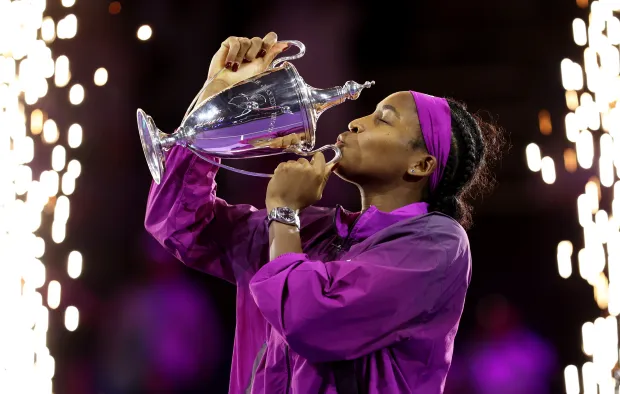
Serena Williams’ former coach, Rennae Stubbs, has stepped forward to defend Coco Gauff following the young American’s triumph at the WTA Finals in Riyadh. Gauff secured her first title at the prestigious season-ending tournament by defeating China’s Zheng Qinwen in a hard-fought final, along with a substantial payday of £3.7 million. However, Gauff’s path to victory was marred by controversy, with some fans accusing her of “tanking” a match to gain a strategic advantage in subsequent rounds.
The controversy arose during the round-robin stage of the tournament. Defending champion Iga Swiatek’s chances of advancing to the semifinals rested on Gauff defeating Barbora Krejcikova in their final group match. Despite Swiatek doing her part by overcoming Daria Kasatkina, Gauff fell to Krejcikova in straight sets, 7-5, 6-4. This result ended Swiatek’s hopes of advancing, while Gauff moved on, having already secured two wins in her group. The outcome sparked criticism, with some fans suggesting that Gauff deliberately underperformed to avoid a potential semifinal rematch with Swiatek, who holds a commanding 11-2 record against her.
Social media platforms were rife with speculation. One X user claimed, “You could see that Coco wasn’t even trying to win this match. Thanks to that Iga was eliminated.” Another fan argued, “Absolutely disgraceful, she lost on purpose. I know 11-2 is painful for her, but have some shame, girl. One of the most shameful moments in WTA history, we will never forget this.”
In response to these accusations, Rennae Stubbs, a former coach of 23-time Grand Slam winner Serena Williams, came to Gauff’s defense on her podcast, *The Rennae Stubbs Tennis Podcast*. Stubbs dismissed the idea that Gauff would intentionally lose a match for strategic purposes, particularly given the draw that awaited her. “Somebody wrote about, ‘Coco tanked the match against Krejcikova so Iga couldn’t get through to the semifinals,’” Stubbs noted, before adding, “No, that’s not how it works.”
Stubbs explained that Gauff had no logical incentive to lose to Krejcikova, as doing so only set up a tougher semifinal clash against world number one Aryna Sabalenka. “First of all, Coco says: ‘I’m going to lose to Krejcikova and then have the possibility of playing Krejcikova again, or I’ve already beaten Iga and now if I lose to Krejcikova, then I get to play Sabalenka in the semis. Yeah!’ No way, that’s not what she’s thinking,” she argued.
Moreover, Stubbs emphasized the financial implications for Gauff. An undefeated run at the WTA Finals would have earned her a significant bonus on top of her prize money. “She’s thinking, ‘I want to win again, I want to get more money into my pocket,’” Stubbs said. “Because if she’d gone undefeated, she’d have made even more money. If you go undefeated, you get an extra bonus.”
Gauff ultimately proved her mettle by defeating US Open champion Sabalenka in the semifinals before edging past Zheng Qinwen in a grueling three-set final. Stubbs highlighted this point, using it to further discredit the idea that Gauff deliberately lost a match to influence her draw. “Arguably, you would say playing against Qinwen at the time was easier than playing against Sabalenka. Why would you want to play Sabalenka?” she said.
For Stubbs, the notion that Gauff would purposely try to eliminate Swiatek is illogical. “For anyone to suggest that Coco went in there with the dubious sense of, ‘I’m going to kick out Iga Swiatek,’ is nonsense. There’s no way you want to lose a match going into the semifinals, arguably playing against the best player on hard courts all year in Sabalenka,” she explained. “So, stop with the nonsense. That is not what happened. She got beat and she was pissed about losing.”
The swirling controversy reflects the high stakes and intense scrutiny surrounding elite tennis players, particularly when they achieve significant milestones like Gauff’s WTA Finals victory. At just 20 years old, Gauff’s composure and success continue to draw admiration, but also, at times, misplaced criticism. While the accusations of tanking may stem from fan loyalty or a misunderstanding of competitive dynamics, Gauff’s performance speaks for itself. Her victories over top-ranked opponents, including Swiatek earlier in the tournament, demonstrate her determination and skill.
Moving forward, Gauff’s focus will likely remain on building upon her remarkable achievements this season. With Stubbs and others in the tennis community rallying behind her, she is well-positioned to handle both the pressures and the opportunities that come with being one of the sport’s rising stars. Whether on or off the court, Gauff’s resilience and talent make clear that she is a force to be reckoned with—and one who plays to win.
Leave a Reply